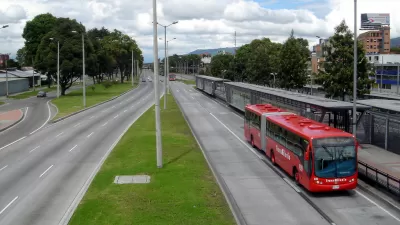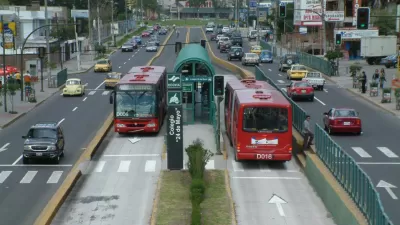It may not be sexy and it may not be fast, but the time has come to acknowledge the key role that the much maligned form of public transit will have in solving cities’ mobility woes, writes Will Doig.
Less expensive and easier to implement than rail-based mass transit, Doig looks to bus rapid transit as a system with the potential to revolutionize mobility in U.S. cities, as it has across the world, from Bogotá to Guangzhou.
According to Doig, "[m]aking people like the bus when not liking the bus is practically an American pastime essentially means making the bus act and feel more like a train. Trains show up roughly when they're supposed to. Buses take forever, then arrive two at a time. Trains boast better design, speed, shelters, schedules and easier-to-follow routes. When people say they don't like the bus but they do like the train, what they really mean is they like those perks the train offers. But there's no reason bus systems can't simply incorporate most of them."
Doig, with the assistance of transit consultant Jarrett Walker, offers some relatively easy fixes to vastly improve the image and functionality of bus systems anywhere, including increasing frequency, improving bus maps, enhancing predictability, upgrading bus stops, and raising the aesthetics of the buses themselves.
FULL STORY: It’s time to love the bus

Alabama: Trump Terminates Settlements for Black Communities Harmed By Raw Sewage
Trump deemed the landmark civil rights agreement “illegal DEI and environmental justice policy.”

Study: Maui’s Plan to Convert Vacation Rentals to Long-Term Housing Could Cause Nearly $1 Billion Economic Loss
The plan would reduce visitor accommodation by 25% resulting in 1,900 jobs lost.

Planetizen Federal Action Tracker
A weekly monitor of how Trump’s orders and actions are impacting planners and planning in America.

Waymo Gets Permission to Map SF’s Market Street
If allowed to operate on the traffic-restricted street, Waymo’s autonomous taxis would have a leg up over ride-hailing competitors — and counter the city’s efforts to grow bike and pedestrian on the thoroughfare.

Parklet Symposium Highlights the Success of Shared Spaces
Parklets got a boost during the Covid-19 pandemic, when the concept was translated to outdoor dining programs that offered restaurants a lifeline during the shutdown.

Federal Homelessness Agency Places Entire Staff on Leave
The U.S. Interagency Council on Homelessness is the only federal agency dedicated to preventing and ending homelessness.
Urban Design for Planners 1: Software Tools
This six-course series explores essential urban design concepts using open source software and equips planners with the tools they need to participate fully in the urban design process.
Planning for Universal Design
Learn the tools for implementing Universal Design in planning regulations.
Caltrans
Smith Gee Studio
Institute for Housing and Urban Development Studies (IHS)
City of Grandview
Harvard GSD Executive Education
Toledo-Lucas County Plan Commissions
Salt Lake City
NYU Wagner Graduate School of Public Service





























